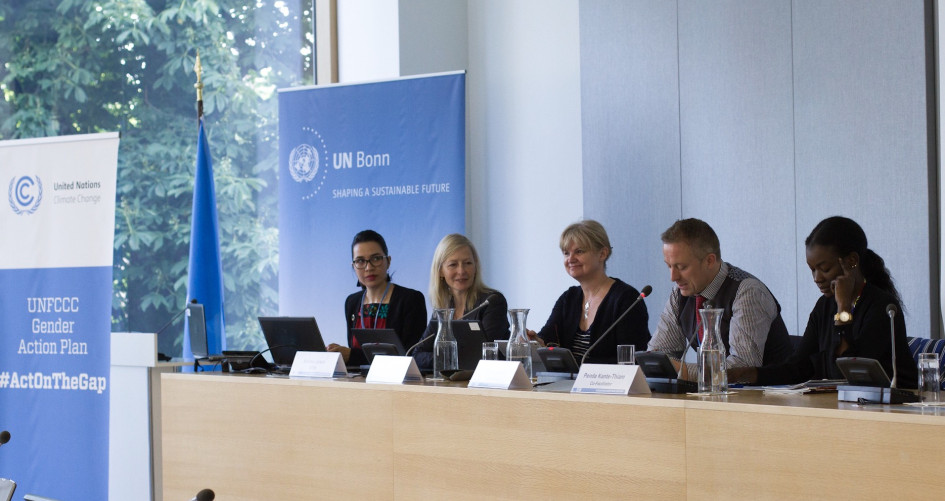UN Climate Change News, 11 July 2019 - Experts meeting at last month’s UN Climate Change Conference in Bonn called on governments and non-government organizations to fully implement the Gender Action Plan (GAP) under the UN Framework Convention on Climate Change, by for example building the capacity within governments to integrate gender considerations in climate plans and action.
Responding to a report by the gender task group of the Intergovernmental Panel on Climate Change (IPCC) - the UN body which evaluates climate change science - government and non-government representatives also called on UN Climate Change to draw on the report’s recommendations for action to increase the representation of women in both processes.
As the IPCC has identified, climate change does not affect everyone equally. The impacts on women and men often differ due to pervasive historical and existing inequalities and multidimensional social factors, including discrimination based on gender, ethnicity, age and disability.
It is therefore critical that climate plans and actions are inclusive and participatory to ensure that the needs, perspectives and ideas of all of humanity are addressed in order to limit temperature rise to 1.5C in line with the Paris Climate Change Agreement.
UN Climate Change actively fosters gender equality and women’s leadership by encouraging governments to take gender-responsive climate action in their revised national climate action plans, known as Nationally Determined Contributions (NDCs), which are crucial to achieving the goals of the Paris Agreement.
New Synthesis Report Identifies Ways to #ActOnTheGAP
Experts at a three-day Workshop on Gender and Climate Change (16 - 18 June 2019) discussed activities undertaken under the Lima Work Programme on Gender (LWPG) and the GAP.
They notably considered a synthesis report focused on the differentiated impacts of climate change on women and men, the integration of gender considerations in climate policies, plans and actions, and progress in enhancing gender balance in national climate delegations.
Based on the collected data, the report delivered a clear message that climate change affects women and men differently, and that its negative effects are especially pronounced in developing countries and for some local communities and indigenous peoples. It also identified the following urgent needs:
- Strengthening capacity-building and awareness-raising within governments and civil society on the differentiated impacts of climate change;
- Increasing gender-responsiveness of climate financing;
- Enhancing the capacity of women delegates in climate negotiations, with a special focus on those from the least developed countries and small island developing states.
The ideas generated at the workshop informed discussions by governments on how to improve the GAP, in preparation for the so-called “pre-COP” which will take place in Costa Rica in October – a ministerial meeting to prepare for the UN Climate Change Conference in Chile in December (COP 25). At the pre-COP, gender will be a priority focus area and, building on the workshop and discussions in Bonn, is expected to lay the groundwork for enhancing the GAP at the Conference of the Parties in Chile in December.
Visit this page for the video broadcast of the Workshop on Gender and Climate Change, the report and the presentations.
Governments and observers can share their views until 30 August 2019 on what has worked and what is still needed for the next version of the GAP.
And read the UNFCCC Newsroom article to learn about 5 reasons why climate action needs women.
- Learn more about Gender and Climate Change.
- Join the conversation on social media using the hashtag #ActOnTheGAP.
- Watch Gender and Climate video playlist on YouTube.
About the Lima Work Programme on Gender and its Gender Action Plan
The Lima Work Programme on Gender (LWPG) was introduced at the Conference of Parties in 2014 (COP20) and enhanced in 2016 (COP22) to achieve gender-responsive climate polices in all relevant activities under the Convention and advance gender balance in climate negotiations.
Subsequently, the Gender Action Plan (GAP) was established to advance women’s full, equal and meaningful participation, and promote gender-responsive climate policy and the mainstreaming of a gender perspective in the implementation of the Convention and the work of Parties, the secretariat, United Nations entities and all stakeholders at all levels.
